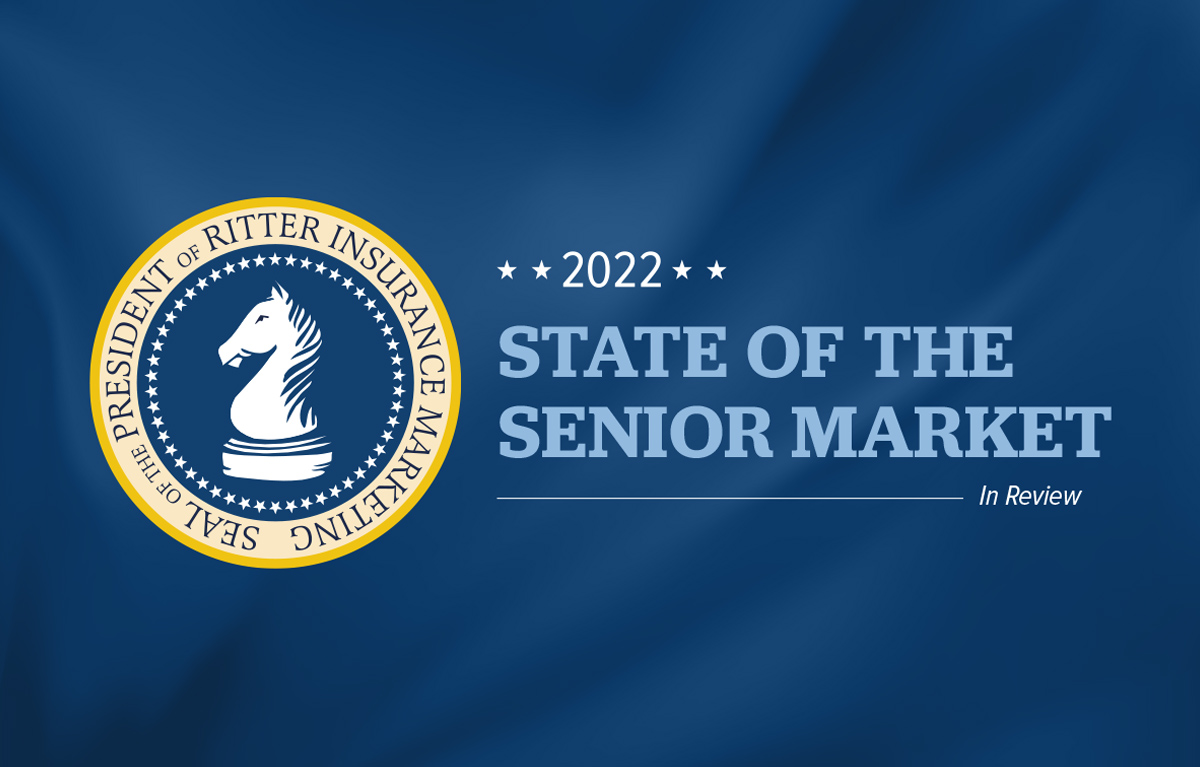Our Compliance Department has analyzed the Centers for Medicare & Medicaid Services 2024 Final Rule for Medicare Advantage and Part D and noted the changes that will most impact agents like you.
Each year, CMS reviews their policies for Medicare Advantage and Part D, proposes changes, then issues a final ruling on what’s changing for the upcoming plan year. It shouldn’t come as a surprise that CMS finalized most of their proposed changes for 2024; however, they did soften several of them. A few of the proposed provisions were not included in the Final Rule; CMS has stated they may address these in future rulemaking.
Listen to this article:
The following rules will go into effect on September 30, 2023, just before the 2024 Annual Enrollment Period marketing period begins. While these changes are only going into effect in a few months, please review them and the full 2024 Final Rule now to start preparing for what’s to come.
New Medicare Marketing Rules for Agents
Prohibits Use of Government Products/Info in a Misleading Way
Includes Medicare name and CMS/HHS logo
If used in a misleading way, agents may not have “Medicare” in their business name, logo, or URL.
Through CMS’ surveillance activities and beneficiary complaints, CMS noted that they have seen the word “Medicare” and the Department of Health & Human Services’ (HHS) logo being used in names of store fronts, postcards, websites, and printed materials in a misleading manner. CMS also noted there are numerous third-party internet sites with “Medicare” in the URL. CMS is concerned that beneficiaries are being misled into believing they are in communication with federal government or its representatives.
As such, CMS will be adding new language in the Code of Federal Regulations to further restrict the use of the Medicare name, CMS logo, and products and information issued by the federal government in a misleading way. CMS also states in the Final Rule that they will be holding the Medicare Advantage Organizations and Part D sponsors accountable for actions by their first tier, downstream and related entities.
We believe it’s unlikely that carriers will approve communication or marketing materials that include the word “Medicare” or the Medicare card, other than to describe the product types.
Clearly, CMS is targeting those red, white, and blue commercials that we all have seen too often. However, the new restrictions will no doubt increase the scrutiny of agents’ and brokers’ activities (i.e., advertisement). We believe it’s unlikely that carriers will approve communication or marketing materials that include the word “Medicare” or the Medicare card, other than to describe the product types (i.e., Medicare Advantage and Medicare Supplement). CMS has clarified that they are not requiring that MA organizations and Part D sponsors discontinue use of the Medicare name if it is not used in a misleading way.
You should not represent your business as one that is “from Medicare” or working “for Medicare.” If a client has ever asked if you’re affiliated with the government, that’s a clear indication that the use of “Medicare” in your name is misleading.
Further restrictions will be added in the Code of Federal Regulations.
See how we’re adhering to this new rule with Medicareful’s rebrand
Modifies the TPMO Disclaimer
Adds SHIPs, the number of the MAO or Part D sponsors, and the total number of products available to the beneficiary
If you’re marketing Medicare Advantage or Part D insurance products, you must include the appropriate revised TPMO disclaimer below on all marketing materials (print and electronic), website, and within the first minute of audio scripts or calls. The disclaimer must be specific to the beneficiary’s service area.
Revised disclaimer for TPMOs that do not sell for all MA and/or Part D plans within a service area:
“We do not offer every plan available in your area. Currently we represent [insert number of organizations] organizations which offer [insert number of plans] products in your area. Please contact Medicare.gov, 1-800-MEDICARE, or your local State Health Insurance Program (SHIP) to get information on all of your options.”
Revised disclaimer for TPMOs that sell all MA and/or Part D plans within a service area:
“Currently we represent [insert number of organizations] organizations which offer [insert number of plans] products in your area. You can always contact Medicare.gov, 1-800-MEDICARE, or your local State Health Insurance Program (SHIP) for help with plan choices.”
Prohibits the Use of Superlatives in Most Marketing
Unless documentation provided to support the statement is based on data from the current or prior year
Agents cannot use superlatives to describe plans, unless also providing recent, factual data that supports their usage and meets CMS requirements. Superlatives include the use of words such as “best,” “most,” “largest,” or “lowest.” This applies to marketing and communication material.
Prohibits Marketing Benefits Where They Aren’t Available
Unless unavoidable because of use of local or regional media that covers the service areas
When marketing plans and benefits, agents must target only beneficiaries who are in a plan’s service areas, unless that’s impossible to accomplish due to the nature of the ad. Examples of “unavoidable” situations include a newspaper ad in a metropolitan area distributed to beneficiaries who live within the metropolitan area but are outside of the plan’s service area or a TV ad that could be picked up in an adjacent market.
Remember this rule in particular when marketing 5-star plans, special needs plans (SNPs), and Part B giveback benefits.
Requires Benefits Marketing Includes the Sponsors’ Names
The names of MAO or Part D sponsors being advertised must be clearly displayed
If marketing plan-specific benefits in print ads, agents must include the names of the Medicare Advantage Organization (MAO) or Part D sponsors in 12-pt font. The names cannot be in a disclaimer. For radio or other advertisements that are voice-based only, the names must be read at the same speed as the phone number.
This rule applies to marketing and communication material content and will require HPMS submission and carrier opt-in, if applicable.
Prohibits the Marketing of Generalized Savings
Applies to savings based on typical expenses of uninsured individuals, unpaid costs of dually eligible beneficiaries, and other unrealized costs
Those marketing Medicare cannot generalize savings when the actual savings are specific to the individual.
Keep this rule in mind when marketing Dual Eligible Special Needs Plans (D-SNPs) and when working with third parties for lead generation.
Updates on PTC & SOAs
Requires 48 Hours Between an SOA and an Appointment
Exceptions for end of enrollment periods and walk-ins
The 48-hour Scope of Appointment (SOA) rule is back. Exceptions to this rule include when a beneficiary is four days or less from the end of a valid enrollment period (e.g., Annual Enrollment Period, Open Enrollment Period, Special Enrollment Period, Initial Coverage Election Period) and unscheduled in-person meetings (walk-ins) initiated by the beneficiary.
Exceptions to this rule include when a beneficiary is four days or less from the end of a valid enrollment period and walk-ins.
Limits How Long SOAs and BRCs Are Valid
Valid for a 12-month time frame from the beneficiary’s signature date or their request for more info
There’s now a time limit, in writing, for SOAs and business reply cards (BRCs) — and it’s 12 months. You will need to get a new Scope of Appointment or permission to contact (PTC) if the original has expired. We recommend tracking the start and stop date within your CRM.
Clarifies the Prohibition on Door-to-Door Contact
Still applies after collection of a BRC without a prior appointment
Citing that it is not a beneficiary’s intention to give permission for an agent to show up unannounced at their home after filling out a business reply card (BRC), CMS reiterates that it remains illegal to “door-to-door” market MAPD and PDP products. Collecting a BRC is not a substitute for permission to knock on a beneficiary’s door without having a scheduled appointment with the beneficiary at that specific time.
Medicare Call Recording Clarifications
Limits the Requirement to Record Calls
TPMOs only need to record marketing, sales, and enrollment calls
Marketing, sales, and enrollment calls are the only types of calls that need to be recorded, per CMS. “Marketing” includes “retention-based marketing,” or influencing a beneficiary’s decision to stay enrolled in a plan. Starting July 10, 2023, “marketing” also includes materials that mention any benefits, including widely avaialble ones, such as dental, vision, and hearing, premium reduction, and cost savings.
Agents should not need to record calls to simply set appointments or check in after sales.
Agents should not need to record calls to simply set appointments or check in after sales.
Clarifies Call Recording Includes Virtual Calls
Applies to video conferencing and other virtual telepresence methods
When conducting marketing, sales, or enrollment calls virtually (e.g., video calls), agents must still record the calls. However, only the audio portion of the calls needs recorded (not the video portion).
Enrollment-Related Updates
New Elements Required Prior to Enrollment
CMS will release more info in the form of a sub-regulatory guidance
Agents must discuss specific topics and information with beneficiaries prior to enrollment. There will be more info to come from CMS in future guidance.
Must Discuss Effect on Current Coverage
Added to the pre-enrollment checklist (PECL) and review of PECL
Whenever a client makes an enrollment decision, agents must explain the effect of their enrollment choice on their current coverage. CMS will issue guidelines on the required discussion items.
Revisions to Medicare Educational & Sales Event Rules
Restricts Appointment Planning at Educational Events
Prohibits the distribution of SOAs and setting up of future appointments
During educational events, agents can no longer collect SOAs or schedule future appointments. Agents are allowed to collect BRCs and PTC and distribute business cards at these events.
Limits Marketing Events Occurring After Educational Events
Marketing events cannot occur within 12 hours of an educational event at the same location
Marketing events cannot take place within 12 hours of an educational event in the same building or adjacent buildings.
We know these changes will modify the way we all do business, but the good news is that there are several months to prepare before they take effect for this Annual Enrollment Period. We’ll be starting to make updates to our materials and programs soon to ensure their compliance with these changes, and we recommend that you do the same.
To learn more, please review the full Medicare Communications and Marketing Guidelines, Medicare Advantage & Part D Communication Requirements or email our Compliance Officer at [email protected].
Editor’s Note: This article has been updated to include information relevant to CMS’ new definition of marketing.






Share Post